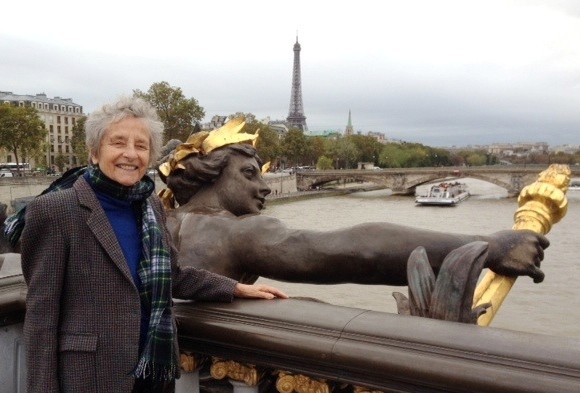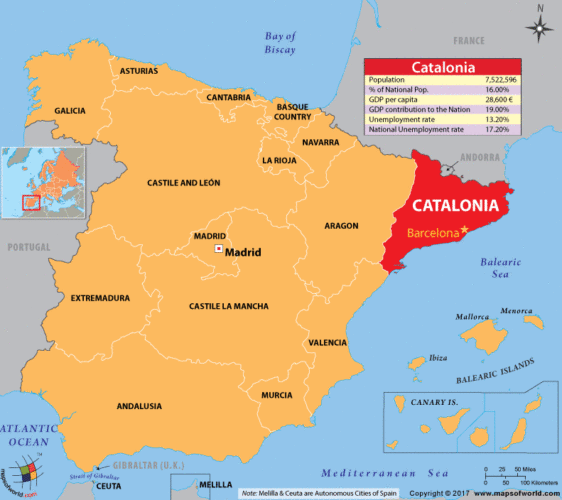
The tentative attempt by Catalonia to secede from Spain has failed – at least for now. But the attachment of the Catalan people to their identity is so strong that the fight for independence is far from over. The Catalonian regional elections on Dec. 21 are likely to take place in a very agitated, if not violent, context.
The province of Catalonia has just lived through its worst political crisis in decades. On Aug. 17, the terrorist attack in Barcelona that killed 13 people and injured 113 left the population of that city badly shaken. On Oct. 1, a referendum showed how divided the population was with 90.2 percent voting for independence … but with a participation rate of only 45 percent. For several days, the two protagonists – Mariono Rajoy, prime minister of Spain and Carles Puigdemont, the Catalan President – faced off each other, avoiding any dialogue.
Then on Oct.17, the separatist members of the Catalan parliament announced the declaration of independence by 70 votes to 10. The situation became untenable for Puigdemont. He surreptitiously left the country to reappear in Brussels. For the first time ever, Article 155 of the constitution was activated — Madrid issued an arrest warrant for Puigdemont for espousing rebellion and placed the province under strict supervision.

How does one explain the fierce nationalism of the Catalan people? It is deeply anchored in their history. Until the early 16th century, the county of Barcelona was at the center of power in Spain and closely united to the Aragon crown. After the War of the Spanish Succession, the Catalans had to surrender to the Bourbons on Sept. 11, 1714. The Catalonians remember that heroic battle by naming that day their National Day, calling it Diadia. The civil war from 1936 to 1939, followed by 39 years of Franco’s fascist dictatorship, crystallized even further the Catalonians’ dream of autonomy.
The European Union (EU) is keeping silent and uninvolved in what it considers as an internal problem for Spain. Doomsday commentators had predicted that other regions of Europe such as Venetia, Lombardy or Corsica, would emulate Brexit. It is interesting to note that Spain never recognized Kosovo for fear that Catalonia would follow suit.
When democracy was reinstated by King Juan Carlos, a new constitution and special self-rule status were granted to the Basque country, Catalonia and Cerdanya in 1978. It is hard to understand why Catalonia did not accept the favorable terms offered by Madrid. The ETA (Basque independence movement) did thus putting an end to their armed resistance, which had lasted for more than 50 years.
A visit to Barcelona helps understand the dynamic, feisty, almost turbulent temperament of the Catalan people. Just mingle with the crowds on La Rambia – the heart of the city – or discover the extravagant architecture of Anton Gaudi in the Sagrada Familia cathedral.
Catalonia can claim three artists, all larger than life and with strong personalities. Joan Miro, the abstract artist creator of distinctive playful forms, was extremely proud of his Catalan origins. Picasso spent several years as a teenager in Barcelona. In 1905, he found the models for his “Les Demoiselles d’Avignon” among the prostitutes of a small street by that name located near the port. The surrealist Salvador Dali went totally wild with the design of his museum in Figueres, his hometown.
Unfortunately, the project of the Catalan separatists did not take into account the long-term problems. By early November of this year, 2,000 companies and banks had already left the province: tourism is being affected: the stock market has plummeted, and if Catalonia were to secede from Spain, it could not become part of the EU.
In the simplest of terms, Catalonia may now, as a result of the most recent developments, find itself in a worse situation than before its declaration of independence.
Editor’s Note: This is the opinion of Nicole Prévost Logan.

About the author: Nicole Prévost Logan divides her time between Essex and Paris, spending summers in the former and winters in the latter. She writes a regular column for us from her Paris home where her topics will include politics, economy, social unrest — mostly in France — but also in other European countries. She also covers a variety of art exhibits and the performing arts in Europe. Logan is the author of ‘Forever on the Road: A Franco-American Family’s Thirty Years in the Foreign Service,’ an autobiography of her life as the wife of an overseas diplomat, who lived in 10 foreign countries on three continents. Her experiences during her foreign service life included being in Lebanon when civil war erupted, excavating a medieval city in Moscow and spending a week under house arrest in Guinea.